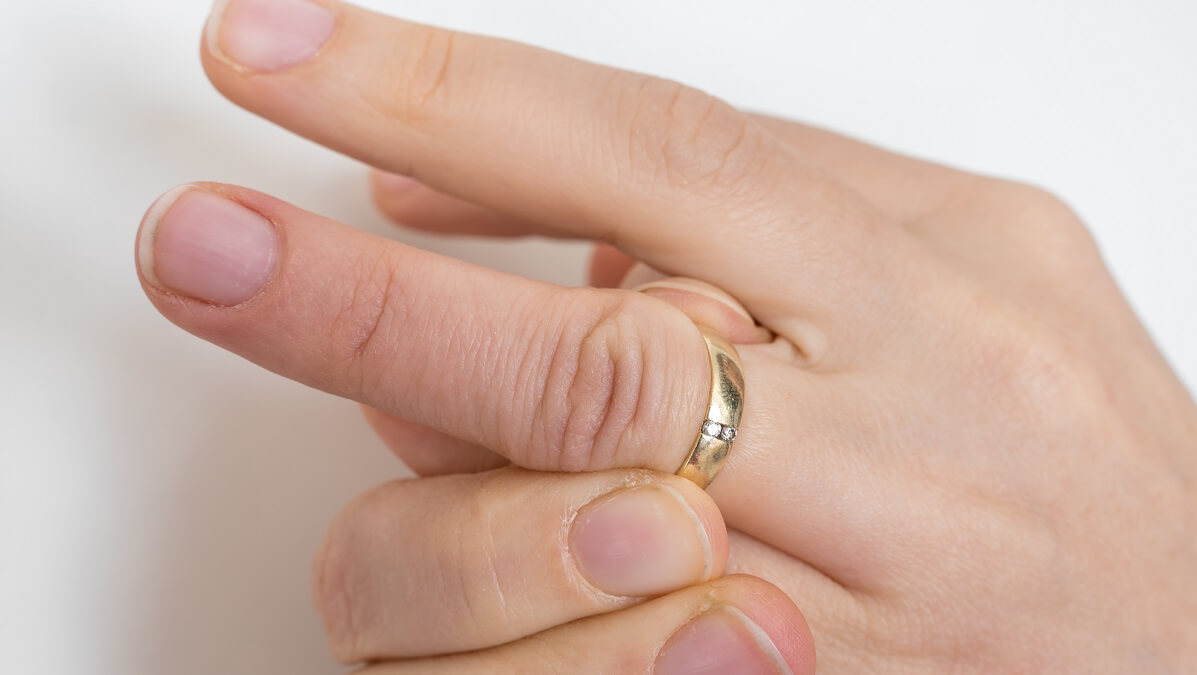Swelling is the result of excess fluid trapped in the body’s tissues. Most people first notice swelling because the affected body part may appear larger than normal. Often, a swollen finger can be easily identified by comparing its size to the size of your other fingers.
Other symptoms you may have
If you’re experiencing swollen fingers, you may also experience:
- stretched or shiny skin
- skin that dimples or pits after pressing on the affected area for a few seconds
- pain
- stiffness or limited range of motion
- warmth or redness of the affected area.
Here are some possible causes behind your swollen fingers:
Heat and exercise
Exercising and being in hot weather both cause an increase in blood flow to certain parts of the body. When you exercise, this extra blood is sent to your heart, lungs, and muscles to help fuel your workout. This causes the small blood vessels in your hands to expand and swell. Hot weather also increases the flow of blood to your skin, so that heat can escape from your body and help to cool it down. This is a natural response and nothing to worry about.
Raynaud’s disease
Raynaud’s disease is a rare condition that affects blood circulation in the extremities, such as the fingers and toes. It is characterised by a narrowing of the blood vessels when triggered by cold temperatures or emotional stress. Symptoms include fingertips turning white or blue due to a lack of blood flow, as well as pain, swelling, and a stinging sensation as the vessels reopen and allow the blood to circulate again. In more severe cases, Raynaud’s disease can cause sores or even tissue death from reduced blood flow.
Read: Should you be worried if your hands and feet are cold all the time?
Gout
Gout, once known as the ‘rich man’s disease’ because of its prevalence among those who could afford lots of meat, seafood, and alcohol, now affects people of all income levels. It is a condition that causes intense pain, swelling, and inflammation in the joints, most commonly in the big toe.
However, it can also be present in other joints such as the fingers. Pain and swelling are caused by an excess amount of uric acid present in the blood that forms crystals in the joint. Fortunately, medications are available to help relieve the pain and reduce the likelihood of future attacks.
Injury
If you have experienced an injury, it is important to take the necessary precautions to ensure proper healing. Ice, rest, and over-the-counter pain medicine can be a great help for minor injuries.
However, if you are unable to straighten your finger, have a fever, or are in a great deal of pain, it is imperative that you seek medical attention. You may have torn a ligament, sprained your finger, injured a tendon, or dislocated or even broken a bone.
Infections
Swollen fingers can be caused by three infections: herpetic whitlow, which involves small, swollen, bloody blisters on the fingers; paronychia, a bacterial or fungal infection at the nail base; and felon, a painful pus-filled infection in the fingertip. Left untreated, these infections can spread to other parts of the body.
Arthritis
Rheumatoid arthritis is a serious condition that affects the lining of joints, leading to swelling, pain and stiffness. These symptoms usually appear first in the hand joints and can affect both hands.
Another type of arthritis, psoriatic arthritis, may affect those who have a skin condition known as psoriasis, and can lead to sausage-like swelling of the fingers and toes. Both types of arthritis can cause joint damage and other problems if left untreated.
Read: Can your diet improve arthritis?
Medications
Some common medications that can cause swollen fingers include:
- over-the-counter pain relievers such as aspirin, ibuprofen, and naproxen
- steroids
- certain drugs for diabetes or high blood pressure
- nerve pain drugs such as gabapentin and pregabalin
- hormonal therapies with oestrogen or testosterone.
Puffy fingers from medication isn’t usually serious, but talk to your doctor if you’re worried.
Carpal tunnel syndrome
Carpal tunnel syndrome is a condition caused by a pinched nerve in the carpal tunnel, located in the wrist. Common symptoms of this condition may include pain, tingling, numbness or swelling in the fingers.
If left untreated, carpal tunnel syndrome can lead to weakness and lack of coordination in your fingers and thumb. Treatment can relieve pressure on the nerve and, for most people, eliminate symptoms.
Kidney problems
Swelling around the eyes, hands, and feet is often one of the first signs that your kidney is struggling. Those with diabetes or high blood pressure are at a greater risk of developing kidney disease, so managing these conditions is important for preventing or slowing the progression of the disease.
Read: What are the warning signs of kidney problems?
Scleroderma
Scleroderma is an autoimmune disorder in which the body produces too much of a protein called collagen. As a result, skin thickens and hardens, and other body parts can become affected. Hands may become stiff and fingers may swell a lot. While some people experience mild symptoms, more serious cases can lead to organ damage. Unfortunately, this condition is not curable, though treatments are available.
Do you have any of these conditions? How do you deal with swollen fingers? Let us know in the comments section below.
Disclaimer: This article contains general information about health issues and is not advice. For health advice, consult your medical practitioner.

